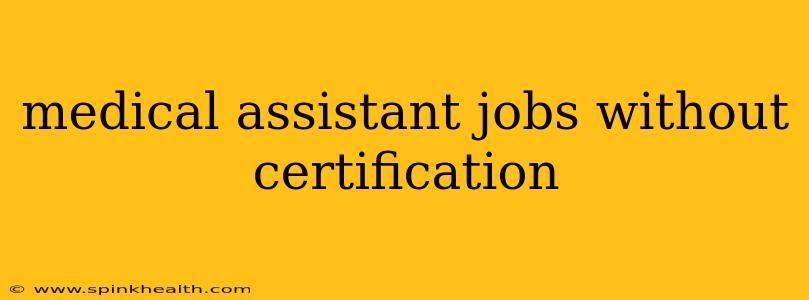Charting a Course: Medical Assistant Jobs Without Certification – Your Path to Healthcare
The world of healthcare is vast and varied, offering numerous entry points for those with a passion for helping others. While certification is often preferred for Medical Assistant roles, it's not always a requirement. Many opportunities exist for individuals eager to start their career in this field without the formal certification. This journey might be less direct, but equally rewarding. Let's explore the paths you can take.
This isn't about circumventing the value of certification—it's about recognizing alternative routes into a fulfilling healthcare career. Certified Medical Assistants (CMAs) hold a valuable credential, reflecting rigorous training and expertise. However, numerous roles leverage transferable skills, offering a stepping stone into the healthcare field, allowing you to gain experience and then pursue certification later.
What are Some Medical Assistant Jobs That Don't Require Certification?
This is a critical question, and the answer depends on your existing skills and experience. Many entry-level positions prioritize a willingness to learn and a positive attitude over formal certification.
-
Medical Receptionist: This role involves greeting patients, answering phones, scheduling appointments, managing patient records (often electronic), and handling insurance claims. While not directly a "Medical Assistant" position, it provides invaluable exposure to the healthcare environment and administrative tasks often performed by CMAs. Many clinics are happy to train motivated individuals.
-
Medical Office Assistant: This role encompasses a broader range of administrative and clerical tasks in a medical setting, including filing, data entry, and assisting with billing and coding. Depending on the clinic size and structure, some of these responsibilities can overlap with those of a CMA.
-
Patient Care Technician (PCT): Although PCTs often require some training, it's typically less rigorous than CMA certification programs. PCTs assist nurses and other medical professionals, often taking vital signs, assisting with patient transfers, and performing basic tasks under direct supervision. These jobs often serve as on-ramps to CMA roles.
-
Home Health Aide: While not strictly a medical office job, home health aides provide basic care to patients in their homes, including personal care, light housekeeping, and medication reminders (under the direction of a nurse). This experience is highly transferable and showcases your commitment to patient care.
-
Phlebotomist: Drawing blood is a critical skill within a medical setting, and while often part of CMA training, phlebotomist training courses are readily available. This specialized skill opens doors to various healthcare settings, even without full CMA certification.
How Can I Increase My Chances of Getting a Medical Assistant Job Without Certification?
Getting your foot in the door requires demonstrating your value. Here's how:
-
Highlight Transferable Skills: Your resume should emphasize any experience related to customer service, administrative tasks, teamwork, communication, and attention to detail – all essential for medical assistant roles.
-
Emphasize Your Willingness to Learn: Be upfront about your desire to learn and grow professionally. Show a proactive approach, highlighting your eagerness to take on additional training and responsibilities.
-
Network: Attend healthcare career fairs, connect with healthcare professionals on LinkedIn, and inform your existing network about your career goals. Many job opportunities are never formally advertised.
-
Consider Volunteering: Volunteering in a medical setting provides practical experience and demonstrates your commitment. It can lead to paid opportunities or strong references.
-
Seek Out Entry-Level Positions: Focus your job search on entry-level roles that require minimal experience. These offer a starting point to build your skills and qualifications.
Should I Get Certified After Gaining Experience?
Absolutely! Gaining hands-on experience significantly enhances your value as a future CMA candidate. The experience will make the certification process easier and more meaningful, and it will also give you a better understanding of the career path as a whole. You will know better which path you want to take within the medical assistant field.
Your journey into the healthcare world doesn't have to follow a single prescribed path. By strategically leveraging your skills and displaying a strong work ethic, you can enter the field as a medical assistant without initial certification, eventually paving the way for career advancement through professional credentials.

